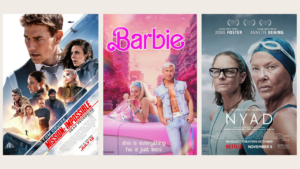Physical Address
23,24,25 & 26, 2nd Floor, Software Technology Park India, Opp: Garware Stadium,MIDC, Chikalthana, Aurangabad, Maharashtra – 431001 India
Physical Address
23,24,25 & 26, 2nd Floor, Software Technology Park India, Opp: Garware Stadium,MIDC, Chikalthana, Aurangabad, Maharashtra – 431001 India

A recent study is urging the entertainment industry to recognize the undeniable reality of climate change through a comprehensive “reality check.”
According to the study, climate change is a present and prevalent issue that affects all aspects of life, yet it remains largely absent from our on-screen narratives. To address this gap, the study introduces the Climate Reality Check, a tool inspired by the Bechdel-Wallace Test, which evaluates whether films, TV shows, and other narratives acknowledge climate change.
Similar to the Bechdel-Wallace Test, which assesses gender representation in media, the Climate Reality Check requires at least one character in a film or show to acknowledge the existence of climate change. This could be achieved through references to extreme weather events or characters explicitly mentioning “climate change” in dialogue.
For instance, the study examined 13 Oscar-nominated films and found that only three of them passed the Climate Reality Check. These films included Barbie, Mission: Impossible — Dead Reckoning Part One, and Nyad.
In Barbie, starring Margot Robbie and Ryan Reynolds, climate change is hinted at during a conversation between Sasha and Barbie about consumerism and its environmental impact where the character says “You set the feminist movement back fifty years, you destroyed girls’ innate sense of worth, and you’re killing the planet with your glorification of rampant consumerism.” The report notes that in Barbie, while the direct phrase “climate change” is not mentioned, the correlation drawn between “rampant consumerism” and “harming the planet” strongly suggests the climate crisis and links climate change to one of its fundamental systemic drivers. Furthermore, by juxtaposing feminism with environmental concern, the film presents an intersectional perspective, highlighting the interconnected nature of these issues and portraying them as stemming from a common adversary.
In Mission Impossible— Dead Reckoning Part One, a film that received two Academy Award nominations, Eugene Kittridge cautions Ethan Hunt (portrayed by Tom Cruise) that the next global conflict will not resemble a cold war. He elaborates, stating that it will manifest as a ballistic conflict driven by the escalating scarcity of resources within a rapidly deteriorating ecosystem. Kittridge predicts a battle for the remaining reserves of energy, potable water, and clean air. Ethan’s mission involves pursuing a rogue artificial intelligence (AI), created by the United States to address the environmental chaos described by Kittridge. Notably, this AI possesses the capability to forecast potential outcomes, a proficiency that could prove invaluable as humanity grapples with the uncertainties of its climate future.
In Nyad, a film recognized with two Academy Award nominations, the challenge posed by climate change is addressed as a hindrance to Diana Nyad’s historic endeavour to swim from Cuba to Florida. During Nyad’s third attempt, she suffers a near-fatal sting from a box jellyfish. In a moment of disorientation, Nyad’s friend and coach, Bonnie Stoll (played by Jodie Foster), attributes the presence of the box jellyfish to global warming, citing research from the University of Miami. Earlier in the film, members of Nyad’s support team aboard the accompanying boat express concern over the presence of the box jellyfish in the area, noting its deadly nature and its unexpected presence in the ocean. Through these two dialogues, the film underscores the connection between climate change and shifts in marine animal habitats, highlighting the dangers posed to individual species, ecosystems, and human well-being, ultimately placing the protagonist’s life at risk.
Importantly, the study emphasizes that passing the Climate Reality Check does not necessitate every story to revolve around climate change, nor does it dictate the type of narratives filmmakers should pursue. It simply assesses whether the current reality of climate change is reflected on-screen.
The study, based on consultations with over 200 industry professionals, aims for 50% of Oscar-nominated films to pass the Climate Reality Check by 2027.
References: https://drive.google.com/file/d/1iJX1tJk6Wwq671ktRA6opM-Dx4aTBim6/view
Image: Collage of Posters of the three movies Barbie, Mission Impossible— Dead Reckoning Part One and Nyad